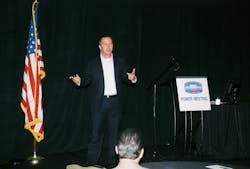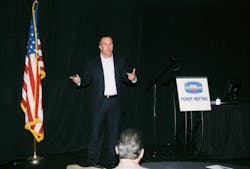QSC members work on bettering themselves at Power Meeting
INDIANAPOLIS — Members of Quality Service Contractors worked on their “soft” skills at the group’s 37thPower Meeting here, and that included working on themselves.
Keynote speaker Kenny Chapman told the contractors that they are in their own way. He was even tougher on himself. What Chapman was trying to get through to the contractors is that they can do anything if they really, truly set their minds to it.
There are some things in life where failure is not even considered. No little kid gives up trying to learn how to ride a bike. In the same (but opposite) way as that little kid determined to succeed, people can will themselves to fail with a bad attitude or mood.
Today, Chapman runs a $3 million service contracting business in western Colorado with a population of 80,000. He dominates his market. That success was not assured when he was younger.
“Everybody has a defining moment in life,” Chapman said. “Mine was when I got arrested at 19.”
A tough judge gave Chapman the option to join the army, getting him away from his drug-taking and -selling lifestyle. Chapman’s parents divorced when he was young and his father became a drug dealer in California.
The point of Chapman’s self-flagellation was his tale of redemption and becoming a successful contractor. He was in the Army when he had to go to his father’s funeral and he didn’t have enough money. He vowed to himself then that he would never again be in a situation where money was an issue. He became a millionaire that day, Chapman told the contractors.
“Goals happen twice,” he said. “Once when it happens in your mind, the second time when you achieve it.”
It’s all in your head. People talk to themselves all day and the conversation can be positive or negative.
“Your accomplishments are the result of a healthy self-image, not the cause,” he said, i.e., don’t look for something external to validate you. It has to come from within.
He also cautioned the contractors not to look to money as the benchmark, because if it is, they’ll never have enough.
Because most people are ruled by bad habits, Chapman urged the contractors to think about what they do that’s holding them back. It could be unproductive habits such as wheel-spinning and time wasters. People are unconsciously ineffective. Chapman told his audience to become consciously ineffective — aware of their own bad habits and what needs to change. The next stage is becoming consciously effective, substituting good habits, but they require thought, effort and practice to accomplish. The last stage is becoming unconsciously effective. The good habits have taken hold and are automatic.
In another session, Jamie Hasty, a vice president at SESCO, PHCC-NA’s human resources and management consultants, talked to the contractors about communicating.
Communication is a process, she noted, moving from the sending through the channel (spoken or written), to the receiver, and, finally, feedback to the sender. There are any number of ways that process can be disrupted, such as a receiver who doesn’t want to listen or a conversation in a noisy disruptive environment.
Employees, Hasty said, always like communications about role clarifications, praise and recognition, and constructive criticism and feedback. They want all the information they need to be successful. Most employees don’t like surprises.
“Make sure you push information downward in a way that’s consistent and clear,” she said.
Many people are poor listeners because they focus on getting their own message out, not on what the other person is saying.
Hasty gave the contractors 10 commandments for good listening.
1. Stop talking. You can’t listen if you’re talking.
2. Put the talker at ease. Help him feel he is free to talk.
3. Show him that you want to listen. Look and act interested. Don’t read your mail while he talks. Listen to understand him rather than reply.
4. Remove distractions. Don’t doodle, tap, or shuffle papers. It may help if you close the door.
5. Empathize. Try to put yourself in his place so you can see his point of view.
6. Be patient. Allow plenty of time. Don’t interrupt. Don’t start for the door or walk away.
7. Hold your temper. An angry man gets the wrong meaning from words.
8. Go easy on argument and criticism. This puts the other person on the defensive. Don’t clam up or get angry. If you win the argument, you still lose.
9. Ask questions. This shows him you’re listening. It helps develop his points further.
10. Stop talking. This is both first and last because all the other points depend on it. You can’t listen well if you’re talking. Hasty quoted Polonius from Hamlet: “Give every man thine ear, but few thy voice.”
About the Author
Robert P. Mader
Bob Mader is the Editorial Director for Penton's mechanical systems brands, including CONTRACTOR magazine, Contracting Business and HPAC Engineering, all of which are part of Penton’s Energy and Buildings Group. He has been with CONTRACTOR since 1984 and with Penton since 2001. His passions are helping contractors improve their businesses, saving energy and the issue of safeguarding our drinking water. He is a graduate of the University of Notre Dame with an A.B. in American Studies with a Communications Concentration.

